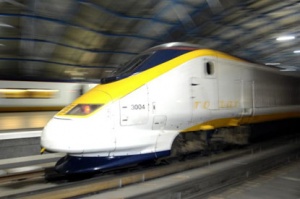UK government reveals plans to replace short-haul flights with trains

Short-haul flights between the UK and Europe could be replaced by a growing rail network of high-speed trains, under new plans outlined by the UK government.
Lord Adonis, the UK transport secretary, said switching 46 million domestic air passengers a year to a new multi-billion pound north-south rail line was “manifestly in the public interest”.
He believes the network will help to manage congestion on existing lines as well as shorten journey times throughout the UK and across Europe.
“For reasons of carbon reduction and wider environmental benefits, it is manifestly in the public interest that we systematically replace short-haul aviation with high-speed rail. But we would have to have, of course, the high-speed network before we can do it,” he told The Guardian.
“I would like to see short-haul aviation - not just domestic aviation, but short-haul aviation - progressively replaced by rail, including high-speed rail.
ADVERTISEMENT
The proposals have met with vehement opposition from the airline industry, with Ryanair chief executive leading the charge.
O’Leary said: “It is insane. The only link you have is one highly priced tunnel. People are not going to travel to the UK regions, including the Lake District and Cornwall, on a [Eurostar] train that only stops at Kent and London St Pancras,” he said.
However O’Leary warmed to switching domestic air passengers to rail as a “valid alternative if you don’t mind the inefficiency and high cost of rail services.”
O’Leary also criticised the government for its new air passenger duty hikes whilst the rail network received billions of pounds in subsidies. He said: “On [return] domestic flights from Glasgow to London, passengers are paying £20 in taxes while they continue to subsidise the railways. Substituting one form of transport that is heavily taxed for a form of transport that is heavily subsidised is not the answer.”
British Airways also joined the revolt. The airline supports the Department for Transport plans to run a new high-speed line via Heathrow airport and on to the rest of the UK, but a spokesperson said it would be impractical to target flights to more distant short-haul destinations such as Madrid, Rome and Prague.
“High-speed rail cannot be a complete substitute for flying,” the company said. “There are relatively few destinations in continental Europe to which it would be practical to travel and return by rail in a day. Therefore flying will always remain the preferred form of transport for millions of travellers.”
The International Air Transport Association (IATA) said a country that had taken decades to plan a third runway at Heathrow airport could take even longer to plan a high-speed rail network.
Lord Adonis has established a company, High Speed Two, that will set out plans for the first leg of the British network, and also examine the potential of extending the line further north to Scotland.
He acknowledged doubts over potentially funding a line that could cost £29 billion should it run from London to Glasgow.
“Other countries which have made high-speed rail a priority have found it affordable by allocating long-term infrastructure funding to it. The French have decided to allocate €16 billion to high-speed rail between now and 2020. It looks to me the more you build it the cheaper it becomes,” he said.

